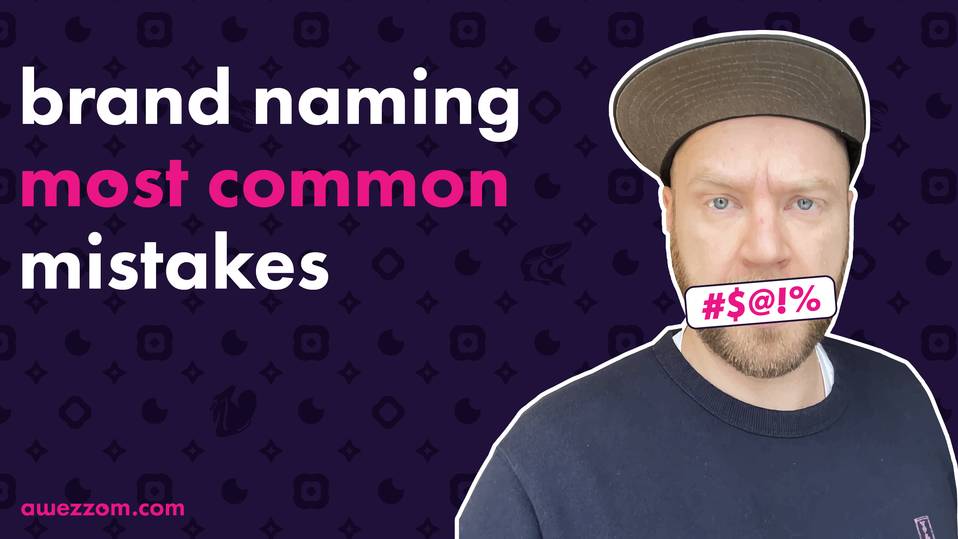This is obviously not a full list of all the naming mistakes. But these are some of the most prominent naming mistakes company leaders make. Avoid these errors and your company name will be golden.
Click this link to read an article if you want to know more about the brand naming process for your professional services firm.
1. The Abbreviations naming mistake
Business managers and key decision makers contemplate under the impression that they should imitate their largest competitors in the marketplace. This extends to naming too.
There is an abundance of multi-billion dollar corporations that have abbreviated their brand names. IBM, KPMG, EY, HP, 3M, CVS, AT&T, DHL — the list goes on. “Why not name our company using the same method? Perhaps this would make us successful too?” — a frequently asked question.
But that’s just the thing — these are large, established corporations, usually market leaders. They can get away with anything. They had started years and years before their categories were even established. They grew the market itself. Everyone knows them.
No one knows your firm even exists. Not really. Not en masse. Don’t make it worse by choosing an abbreviated company name.
2. The Efficiency naming mistake
Business owners often think that there is an app for everything. If there is a naming app it’s going to solve the problem fast and cheap. Preferably for free. That’s the pinnacle of efficiency, isn’t it?
The kind of app is rather easy to find. Just search online for a “business name generator”. Long story short — we have tried using these apps ourselves and they never produce good brand names.
Giving the devil it’s due — these tools are useful. But not to generate company names. They are useful to understand what company names you shouldn’t use. Why? Because everyone else has access to these same tools since they’re free and easy to find.
Good brand names are hard to come by. Most of them are already taken. First bright ideas that come to mind are usually too obvious. It takes a framework to generate a handful of solid business names and a good deal of research to put each one to the test.
3. The Trendiness naming mistake
When a certain type of naming becomes fashionable, everyone keeps naming their companies the same way. When Shopify became a success many companies started adding suffix “-ify” to generic names. When Twilio became successful, adding an “-io” became popular.
While some names might be cool it’s best to avoid falling into this trap of trendiness or else risk ending up with a fad of a name. Consider these names: inselio, boolio, furlio, eatlio, drinklio, taxilio — you get it. The trendy suffix is not necessarily a good choice for your company.
The test is quick and simple — does it make sense? For example, would it be OK for an attorney-at-law firm to call itself “Attornio”? Would it create the sort of association you want your prospects to have? Or will it make people smirk?
4. The Generic naming mistake
During the naming workshop business leaders arrive at one or two brand names that resonate deeply with the team. Usually it is a simple, short name, for example: forest, tree, leaf, ocean, shore, core, berry, hill, etc. There is nothing wrong with either of the words except that these are too generic to be used for a brand name.
Put yourself in your customers’ shoes. Think of someone who is exposed to the brand name for the first time. Would you be more interested in an Uphill, a Hillton, a Hillio, a Hillberg, a Grasshill, a Fullhill, Hillbright or just a Hill? Which of the names would rouse your interest in a particular industry?
In addition, the generic names are usually taken. The competition on the name itself is going to be high. Then there are problems with trademarks. A generic name is just too much of a problem and it almost never has substantial benefits.
What are the real consequences of having a bad brand name?
We hear it from business leaders — “You can change the name later. It’s not a big deal.” Yes, it is true — you can change the name later. But . . .
Why would you want to have all of your marketing efforts with previous name go to waste? If a company keeps renaming its brand — will it be helpful in the long run? We don’t think it’s a good strategy to keep changing names.
The problem is this. If the company didn’t put effort, time and money into researching the good name then it doesn’t have that attachment to it and a new, hip name might seem like a great idea for a change. The biggest problem is when the company changes its brand name and that fact confuses its clients.
On the one hand it’s just a name. But on the other hand — what’s important is — how that name resonates with what’s in the minds of clients. If your brand name is already known for something, especially if it’s something of value, then why change it?
How long should the brand name be?
There is no golden standard for the length of the brand or company name. But generally speaking it is good idea to have a shorter name — the kind of name that is easy to pronounce.
Longer names tend to be abbreviated by customers because it’s too troublesome too pronounce them. Consider this company name — “American Institute of Brand Naming.” Will you casually pronounce the whole name in a conversation? Will you type this length of letters into a textbox on your phone? Very unlikely. So people will try to abbreviate or shorten the name.
Federal Express became FedEx not by design but by the forces of the marketplace. People weren’t happy with the long name and came up with a distinct shorter version of the company name.
But there is a problem you need to be aware of. You cannot force a marketplace to use the name you want. They will use it differently if the name isn’t right. You are at their mercy. If you choose a long name for your company you’d better pray the shortened version isn’t ridiculous.
Are short brand names better?
In general — yes. But there is another problem. Most super-short names like EY, HP, AEG, IBM are already taken. Not that these are good company names. It’s just that they are unavailable. So they are out of bounds for your small business.
Good, two-syllable words are rare but not impossible to come up with. Three and four-syllable brand names are in abundance at the moment.
The name crafting process requires you to take your prospects into consideration. If the shortest name you came up with would have less of a positive impact on your prospects then it’s better to choose a longer name for the company and brand.
Consider hiring a naming expert to create a really good name for you small business.
Watch video about Brand Naming workshop
The awezzom question of the day:
Do we want to repeat the mistakes we are not even aware of or should we hire a naming consultant?

